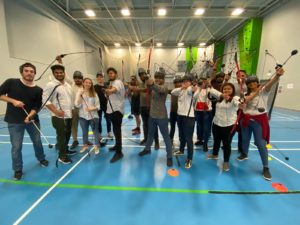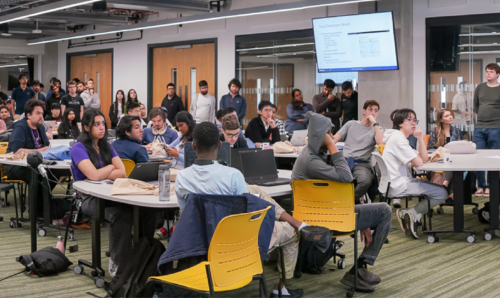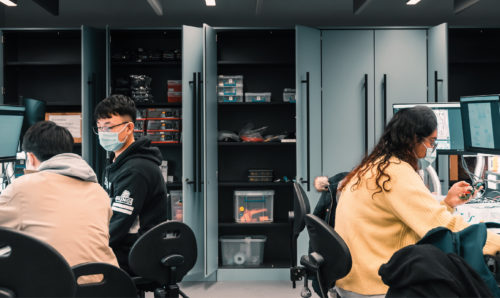Meeting our alumni: Mustafa Khanwala, from student to MishiPay Ltd founder.
EEE in the real world Student experience 31st January 2022
Mustafa is a EEE University of Manchester alumnus. He studied BEng (hons) Mechatronic Engineering and graduated in 2014. He took some time to tell us what he has been up to since:
What is your current job title and what does your job involve?
 I am the Founder and CEO of MishiPay Ltd. I started the company in 2015 and have grown it to over 60 employees between 4 offices, having put our product into retailers in 14 countries with over 500 contracted stores. We’ve also had the privilege to involve some of the biggest investors in retail tech such as American Express, Nauta Capital, United Ventures, and some very exciting angels along the way, who together helped us raise over £9.5M in funding to support our business and its growth.
I am the Founder and CEO of MishiPay Ltd. I started the company in 2015 and have grown it to over 60 employees between 4 offices, having put our product into retailers in 14 countries with over 500 contracted stores. We’ve also had the privilege to involve some of the biggest investors in retail tech such as American Express, Nauta Capital, United Ventures, and some very exciting angels along the way, who together helped us raise over £9.5M in funding to support our business and its growth.
What is the impact of your work?
We allow shoppers in store to use their phone to scan the barcode of an item and get all its details, pay for it on their phone and leave the store with the item, without ever having to wait in a line again. In 2021 alone, this has resulted in saving 150,000 shoppers over 9,000 hours of potentially waiting in queues while allowing retailers to increase their sales by over £1M due to MishiPay’s ability to increase average basket value, improve user return frequency and regain previously abandoned baskets.
Did your studies at UoM prepare you for this career path? Is it directly related to your degree at Manchester and specialised?
Yes, my studies at UoM played a part in how my career turned out. Even though what I do isn’t directly related to my degree, I did get a very solid foundation of critical thinking and problem-solving through studying engineering and some of the specific skills like circuit design, pcb manufacturing, programming, and others learned on individual and team projects during the course were extremely useful in the early days to build prototypes and demonstrate what I wanted to do at MishiPay.
Did you participate in any additional activities at UoM that may have helped you secure your job and gain more holistic life skills?
Yes, I was part of a few clubs and societies and clubs during my studies. I was also a student rep for the Staff Student Liaison Committee (SSLC). Of the clubs, I guess the main one that comes to mind is the Manchester University Canoe Club I joined in the very first months of my first year. It was a brief period of fun with them but the stories of kayaking on those 3 rivers I did with the club are still great conversation starters to this day. The SSLC was also useful in terms of getting the first taste of negotiations, facing bureaucracy and the difficulty to change things in the face of it, perhaps that has helped with doing B2B enterprise sales over the years with MishiPay where we must deal with similar types of situations in very big and often, traditional retailers.
What do you remember most fondly from your studies at Manchester?
The friends I made, one of them is my co-founder and CTO at Mishipay.
How did you go about job hunting/creating? At what point did you start doing this?
 I went from hunting for pure engineering jobs to then hunting for more tech consulting to then fintech with the bigger investment banks and went through the usual struggle of applying to a lot of places, getting a lot of rejections, doing assessment centres, etc. At the end of my time at Manchester, I had 1 offer for a yearlong placement as a design engineer at a factory, but I instead chose to pursue my masters at UCL after which I had 3 offers for joining either Goldman, Barclays, or KPMG in fintech-related roles. Eventually, though I turned them all down and started MishiPay instead when I thought of the idea while waiting in a line at Lidl in Tottenham Hale. At that time, my engineering degree was extremely useful in building the first prototypes and understanding how to get started with creating something from scratch, particularly with how to acquire the right knowledge and ask the right people for help.
I went from hunting for pure engineering jobs to then hunting for more tech consulting to then fintech with the bigger investment banks and went through the usual struggle of applying to a lot of places, getting a lot of rejections, doing assessment centres, etc. At the end of my time at Manchester, I had 1 offer for a yearlong placement as a design engineer at a factory, but I instead chose to pursue my masters at UCL after which I had 3 offers for joining either Goldman, Barclays, or KPMG in fintech-related roles. Eventually, though I turned them all down and started MishiPay instead when I thought of the idea while waiting in a line at Lidl in Tottenham Hale. At that time, my engineering degree was extremely useful in building the first prototypes and understanding how to get started with creating something from scratch, particularly with how to acquire the right knowledge and ask the right people for help.
What do you love about your role and the journey that got you there?
The fact that I have built something real that I can proudly say has generated millions in revenue for customers and even from customers and is used by thousands of people every day. My team and I are saving approximately 2,000 hours of queuing time a month at the moment and that figure is only going to go up.
How have you found working life compared to student life? How have you had to adapt?
Everything was much easier and better laid out as a student than I could have imagined (even though it didn’t feel like that at the time) and maybe it would have been similar with a bigger corporate if I had joined one but as a start-up founder there has been a lot to learn and discover along the way with no well-assured path on how to succeed but that has been the best part of it.
Any advice or top tips for students looking for work experience or job opportunities?
 One of the best pieces of advice I have heard recently (from Scott Galloway) is for students to not fall into the trap of trying to follow their passion, instead to find something they are good at and work hard, really hard, to become great at that. When you are great at something and doing well, you will truly become passionate about what you do. I agree with this and what I would add to it would be to follow one goal at a time, a single-threaded focus will really take out the doubt and confusion about what to do and that is what really gets most students, as they aren’t sure what they are good at. So, my advice to find out what you are good at is; pick something you think you are good at and try it and if that fails then move to the next best thing and try and keep repeating until you find what you are reasonably good at, then work like crazy to become great at it. The mistake a lot of people normally make, and I made the same initially, is to try to do too many things at once in an effort to “keep the doors open” but the truth is that most of these doors never close permanently and in trying to do too many things at once, you increase your chances of failing at all of them, so I would definitely recommend trying one thing at a time.
One of the best pieces of advice I have heard recently (from Scott Galloway) is for students to not fall into the trap of trying to follow their passion, instead to find something they are good at and work hard, really hard, to become great at that. When you are great at something and doing well, you will truly become passionate about what you do. I agree with this and what I would add to it would be to follow one goal at a time, a single-threaded focus will really take out the doubt and confusion about what to do and that is what really gets most students, as they aren’t sure what they are good at. So, my advice to find out what you are good at is; pick something you think you are good at and try it and if that fails then move to the next best thing and try and keep repeating until you find what you are reasonably good at, then work like crazy to become great at it. The mistake a lot of people normally make, and I made the same initially, is to try to do too many things at once in an effort to “keep the doors open” but the truth is that most of these doors never close permanently and in trying to do too many things at once, you increase your chances of failing at all of them, so I would definitely recommend trying one thing at a time.
alumniElectrical and Electronic Engineeringstart upStudent experience





Leave a Reply